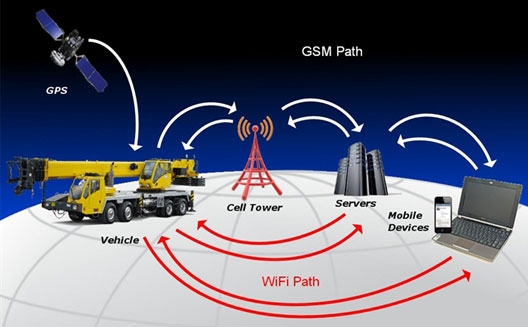4 tips for telematics startups in the Middle East

The first edition of the Telematics Conference Middle East & Africa in Dubai earlier this year gave UAE-based entrepreneurs the perfect opportunity to not only network but to pitch their telematic startups.
“Finding such startups was a challenge,” said conference director Alenka Bezjak Mlakar. “We decided to do that because startups often have new and original ideas that they find hard to pitch in this niche while large corporations are always on the lookout for new ideas. That’s why the conference offered a networking opportunity to participants.”
Three startups
Telematics combines telecommunications, logistics management, big data and sensors like GPS locators. It has the potential to streamline operations for companies that need to track multiple moving components, like a fleet of vehicles.

What are telematics and how do they work? (Image via
hedonline.com)
Entrepreneurs who attended Telematics Conference Middle East & Africa saw it as an opportunity to network with key players in the telematics field, pitch their ideas (and hopefully attract large corporations), raise funds, get tips, and discover the latest trends in the sector.
In this first edition, three UAE-based startups pitched their ideas:
Dashroad: Faheem Gill, who founded the startup in Feburary of this year, said that the company’s goal is to “come up with software to connect cars to the internet.” He established the company in Dubai in anticipation that the city will eventually become a transport hub for India, Europe, and other international players.
LoadMe: This startup wants to be the next Uber-like service for the trucking industry in the Middle East. Its CEO, Sebastian Stefan, doesn’t miss an opportunity to pitch his idea and has participated in many events in the last few months such as Turn8’s Investor Demo Day and the GCC Pitch Challenge. Stefan noted that this event would allow him to meet telematics solution or service providers that might be interested in integrating their services in LoadMe.
Inquiron: Its CEO, Raymond Kenney, emphasized that his idea was born out of the urgent need to manage complex political and security information in remote border areas such as in Iraq and Eastern Africa. He added that the technology that his company provides helps companies use data for optimal decision-making.
It might still be a long way before these startups gain a place among the big players; however, the latter have offered entrepreneurs a handful of tips to help them succeed:
-
Be different: Antanas Segzda, sales director for Southern Europe for Teltonika, emphasized that international players are seriously looking at the Middle Eastern market. Hence, startups must be different. “They should look at what global companies are doing and do it better and in a smarter manner thanks to their better understanding of the local customer requirements,” he explained.
-
Master the Rational Unified Process (RUP): Boris Pankov, CEO of Omnicomm, believed that it’s a key factor in the success of any company. “You have to understand well your collaborative relationship with other companies, develop a revenue model that benefits all parties involved, and define what you can offer or provide to your partners,” he said, adding that “once you understand that well and clearly, you can move to the next stage and prepare an action plan which should be profitable to all parties involved, then develop the service or product, and wait for feedback.” The more you work on the first stage, the more your chances at succeeding increase even if your plan is to localize a concept that has been already developed abroad.
-
Listen well to the market requirements: Tracy Ryan, head of international marketing at Telogis, believes that the most important thing is to listen well to the market requirements becausethe latter vary from one market to another. One must be able to listen to and adapt with the different sectors and regions, especially in the Middle East which is different than the rest of the world.”
-
Go, go, go, repeated Zaim Azraq, CEO of Location Solutions, noting that existing ideas are magnificent but that market conditions are difficult. He stressed that sales might be difficult in the Middle East, especially since they rely on who you know just as much as your professional skills, making the region one of a kind when it comes to closing deals. Perseverance is important too because there are multiple players and improper competition at times due to the cheap and bad quality devices that fill the markets.
With the Middle East as one of the fastest growing emerging markets in the telematics sector, and due to its unique environment, home-grown ideas and innovative solutions are needed in the region, for the region.


